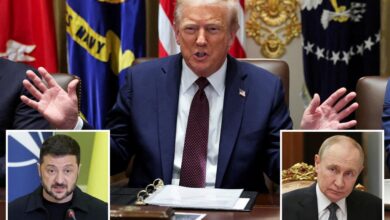Trump threatens more tariffs on nations with digital taxes that ‘discriminate’ against US tech giants

President Trump has threatened more tariffs on countries with digital taxes that “discriminate” against US tech companies while giving Chinese tech firms a free pass – and is reportedly weighing sanctions on EU officials, according to a report.
In a fiery Truth Social post late Monday, Trump threatened “substantial” tariffs and chip export curbs on countries with these taxes, which the White House has argued pose a threat to free speech.
🎬 Get Free Netflix Logins
Claim your free working Netflix accounts for streaming in HD! Limited slots available for active users only.
- No subscription required
- Works on mobile, PC & smart TV
- Updated login details daily
“Digital Taxes, Digital Services Legislation, and Digital Markets Regulations are all designed to harm, or discriminate against, American Technology. They also, outrageously, give a complete pass to China’s largest Tech Companies,” Trump wrote.
“Unless these discriminatory actions are removed, I, as President of the United States, will impose substantial additional Tariffs on that Country’s Exports to the USA, and institute Export restrictions on our Highly Protected Technology and Chips.”
“Show respect to America and our amazing Tech Companies or, consider the consequences!”
Behind the scenes, White House officials have been weighing sanctions on European Union and member state officials responsible for the Digital Services Act, two sources familiar with the matter told Reuters.
State Department officials have yet to make a decision on whether to impose these penalties, which would likely come in the form of visa restrictions, the sources said.
“We want free speech, not government-controlled speech,” Anders Vistisen, a Danish lawmaker in the European Parliament, told The Post.
“So it’s great to see Donald Trump stand up and defend this fundamental right from such a dangerous attack by unelected Brussels bureaucrats.”
Tensions are already high between the US and EU soon after a trade deal locked in 15% tariffs on the trading bloc and pledges for Brussels to ramp up spending in the US.
Dozens of countries currently impose DSTs, which typically only apply to the world’s largest tech firms, like Meta, Alphabet and Amazon – all of which are based in the US.
These nations claim that since firms like Meta operate within their borders and generate massive profits from their citizens, they should be required to pay taxes to their respective governments.
The EU has argued that its Digital Services Act includes safety regulations targeted at preventing the spread of illegal content – like hate speech and child sex abuse material – online.
But the US has said that the law’s efforts to combat misinformation are “undue” restrictions on freedom of speech, and Meta has claimed the DSA amounts to censorship of its platforms – Facebook, Instagram and WhatsApp.
“This is something we can firmly rebut,” European Commission spokesman Thomas Regnier said during a press briefing on Tuesday.
“The DSA does not look at the color of a company, at the jurisdiction of a company nor at the owner of a company.”
He previously said the claims that the digital tax is a censorship tool are “completely unfounded,” adding that officials are “fully respecting freedom of expression.”
A spokesperson for the State Department said: “We are monitoring increasing censorship in Europe with great concern but have no further information to provide at this time.”
Earlier this month, Secretary of State Marco Rubio urged US diplomats to convey to their EU counterparts concerns about the DSA and its potential costs for top US tech firms.
In May, Rubio threatened people who “censor” speech by Americans, including on social media, with visa bans – signaling that the bans could apply to foreign officials regulating US companies.
France has long been one of the loudest voices inside the EU calling on the 27-member bloc to strike back against the Trump administration.
The Post exclusively reported last month that French officials wanted to use a so-called “anti-coercion instrument” – a never-before-used law that can ban some American companies from doing business in Europe.
The Elysee, the French presidential office, did not respond to The Post’s request for comment.
DSTs have emerged as a crucial issue for the Trump administration during the president’s ongoing trade talks.
In June, he threatened to cut off negotiations with Canada over its digital tax.
Canada quickly walked back the policy just before it was set to take effect, and the White House boasted that the major trading partner had “caved.”
Credit to Nypost AND Peoples



